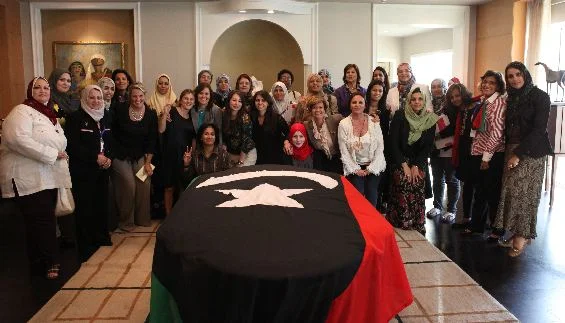Statement from the Libyan Women's Platform for Peace
Libya-declaration
From 7-9 October 2011, the first meeting of Libyan women from all walks of life took place in Cairo. This group included women from a broad range of ideological and professional backgrounds, including activists, house-wives, academics, entrepreneurs and young bloggers who all fought-literally and physically-for freedom.
Libya’s uprising was first sparked on February 15th when mothers, sisters, and widows protested the imprisonment of their lawyer, as well as the courthouse demonstration . Women took to the streets in daily demonstrations and protests, participated in founding the municipal councils of the revolution and the National Transitional Council, ran rebel support cells, printed and distributed leaflets and fought Gaddafi’s troops with all means.
Overall recommendations:
Women should be fully included, at top levels, in all processes of conflict resolution and transformation. This includes processes of transitional justice, the set-up of a new security system and compensatory regulations.
When having formal or informal contacts with actors from the Arab spring, make sure women are involved at the top level from the very beginning; not only in traditional roles, but in leadership roles.
By the same token, we demand the implementation of Resolution 1325 thus giving women a strong voice in conflict resolution and transition.
Women’s rights are human rights. Women deserve equal rights in full conformity with international conventions.
Specific recommendations for Libya:
The National Transitional Council and the Libya Contact Group of Arab and European governments must recognize, as we do, that since women paid a heavy price AND played a leadership role and in the revolution this should be reflected in NTC’s formation. We encourage a strong representation of women in the NTC and any future government.
The mandatory UN Security Council Resolution 1325 calls on all States to increase the number of women in decision-making roles related to peace and conflict resolution. Libya is one of the only two Arab nations to hold a seat on the Executive Board of UN Women;
we demand that Libya retains its seat at the UN Women’s Board.
The UN General Assembly recognized the NTC last month as the legitimate government of Libya. It is time for the NTC to fulfill its obligations to represent Libyan women fully.
Women represent a near-majority constituency whose power has been suppressed during the last 42 years. The new Libya will fail to eradicate many of the abuses and discrimination perpetuated by the former regime without a strong commitment to responding to the legitimate demands of women.
We thus look forward to participating fully in political, social, economic and
judicial policy-making. We look forward to engaging in a direct dialogue with the Organization for Security and Cooperation in Europe.
Image courtesy of Dominique Margot

